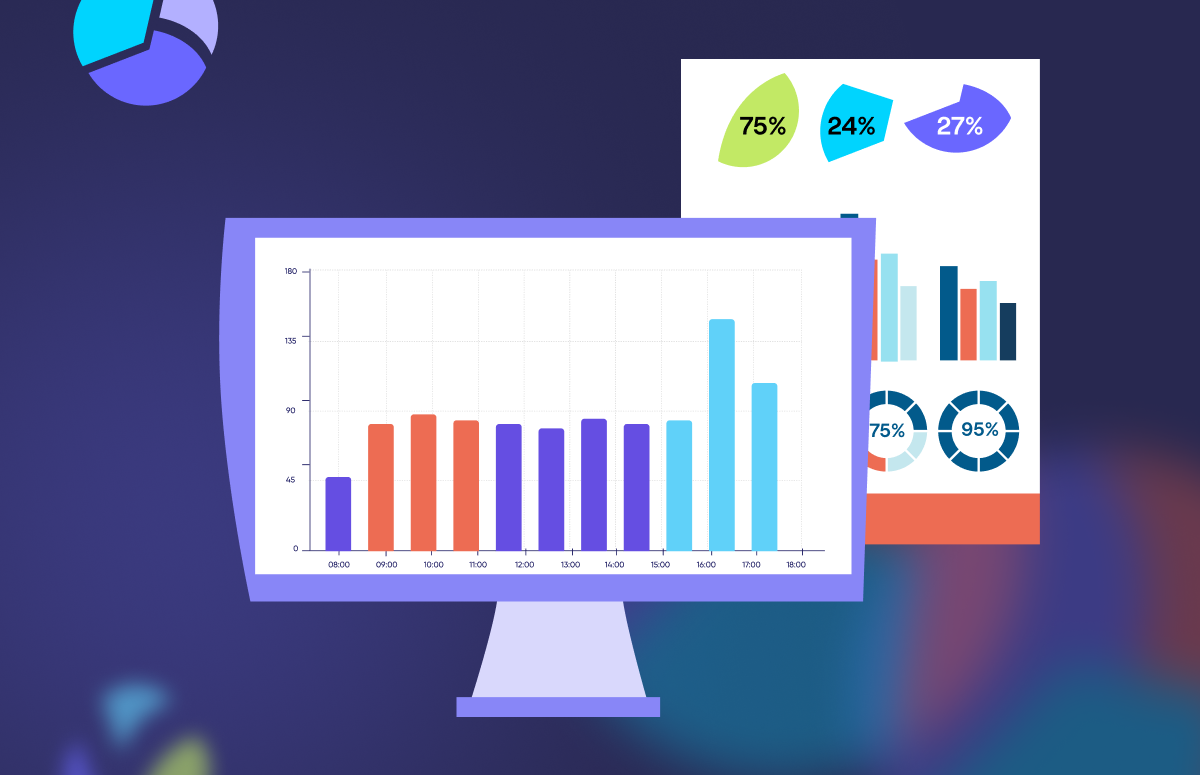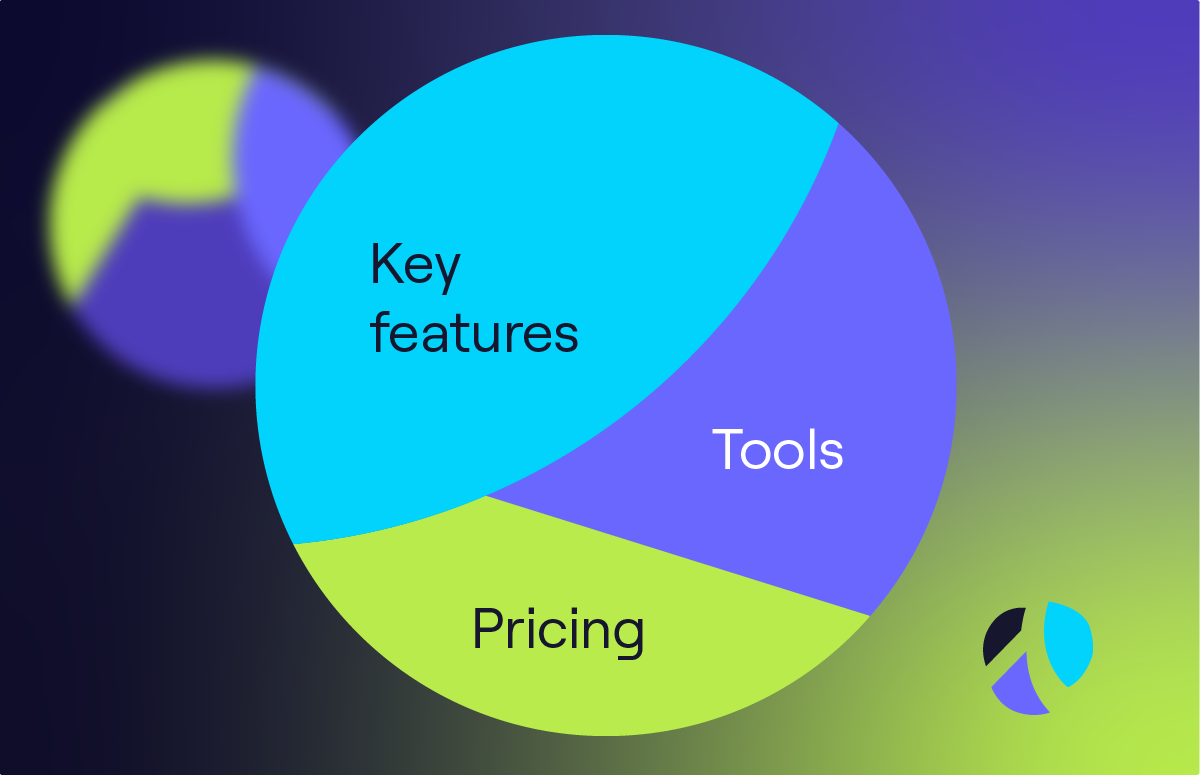Enterprise Tech Stacks: The Ultimate Guide
The ultimate enterprise tech stack:
In business, choosing the right enterprise tech stack is almost as important as picking the right people.
Get both right and 💥
You’ve created an all-star team powered by the best that technology has to offer.
One slight problem…
There are thousands of tools to choose from!
It can be overwhelming, to say the least.
To help you pick the right tech lineup, we’ve narrowed your search to nine highly impactful enterprise sales and marketing tools.
These should help your enterprise surpass its revenue targets like a runner in a springy new pair of sneakers.
1. Cognism
The enterprise marketing and sales process depends on high-quality data.
Without it, personalisation becomes difficult, emails bounce, and your reports mislead you.
To get better B2B data, use Cognism, a B2B sales intelligence tool that helps you uncover key information about your target accounts and contacts, from email addresses to technographics.
With Cognism, you can:
- Quickly build highly targeted lead lists with filters and AI-powered search.
- Find lead email addresses, mobile phones, direct dials, and more.
- Keep CRM records up-to-date with automated data enrichment.
- Worry less with enterprise-grade data compliance and security.
Whether building an email list or investigating a target account, Cognism speeds up the process so your team can focus on selling.

Key features
- International data coverage (leader in EMEA).
- Phone-verified cell phone number accuracy to help you connect with 87% of your list.
- Exclusive on-demand verified cell phone and email data set Diamond Data®.
- Technographic and firmographic data.
- GDPR and CCPA-compliant.
- Easy integrations with Salesloft, Outreach, Salesforce, Pipedrive, and other common tools.
- Buyer intent data through Bombora.
- Browser extension for LinkedIn, Sales Navigator, and company websites.
Cognism pricing
- Cognism offers bespoke pricing packages personalised to your business needs and workflows.
- It charges a flat platform access fee that covers data maintenance, set-up, onboarding, and 24-7 live chat support.
- All users get unrestricted access to Cognism’s data (subject to fair use policy).
- Integrations are included in every package.
- Ask Cognism for a quote.
2. Salesforce Sales Cloud
Every enterprise sales team needs a powerful customer relationship management (CRM) system, and Salesforce is one of the best you’ll find.
Its feature set is as wide as it is deep, offering robust tools for sales automation, prospect engagement, customer journey management, and more. Notably, its reporting functionality is one of the most advanced in the CRM category.
Salesforce is always developing and it’s on the cutting edge of AI sales technology. For example, the CRM now offers AI tools like AgentForce SDR, an autonomous agent that uses generative AI to engage inbound leads, overcome objections, and book meetings.
Side note: Many enterprises that use Salesforce for sales management also use it for marketing and customer service.
Key features
- Contact management.
- Lead and opportunity management.
- CRMs for sales, marketing, support, and operations.
- AI sales tools and SDR agents.
- Custom reporting and dashboards.
- Quote management.
Pricing
- 30-day free trial.
- Starter: $25 per user, per month.
- Pro Suite: $100 per user, per month.
- Enterprise: $165 per user, per month.
- Unlimited: $330 per user, per month.
- Einstein 1 Sales: $500 per user, per month
3. Gong
Gong is a revenue intelligence platform that helps you glean insights from your sales interactions, including meetings, demos, calls, emails, and every other touchpoint.
For example, you could use it to analyse cold calls across your sales team and identify best practices that lead to booked meetings.
With information about what’s working (and what’s not), sales managers and reps can intelligently improve their call scripts, sales messaging, and phone skills.
Key features
- Call recording and analytics tools.
- Deal tracking and intelligence.
- Key quote extraction.
- Conversation trends.
- Call library for self-learning.
- Integrations with top sales tools.
Pricing
- Reach out for a custom quote.
- Licences are priced per user.
- Free integration with your current tech stack.
4. Salesloft
Sales reps — especially SDRs — have a lot of outreach to conduct.
So much so that it can feel almost impossible to manage, especially when every touchpoint needs personalisation to stand out.
Salesloft, a sales engagement platform, is the antidote. Its toolkit enables reps to engage with leads in a personalised manner at scale.
For example, the sales cadence builder allows you to create multi-channel outreach sequences that contain email templates. These templates autofill with specified lead details, such as their name or location. That means that in just one click, you could send 100 targeted cold emails.
Using the tool’s email analytics, reps can track leads’ positions in the cadence and monitor email opens and clicks to see which leads are most engaged.
Key features
- Sales cadence builder.
- Email campaign management.
- Email tracking and analytics.
- Integrated dialer.
- Advanced features like deal intelligence and pipeline management (aka Salesloft Deals).
- Salesloft Chrome extension.
Pricing
- Contact for a custom quote.
5. PandaDoc
PandaDoc is a document management platform that enterprise customers use to quickly draft, approve, track, and e-sign contracts and proposals.
It offers a library of templates for various themes and situations. You can customise these templates using the interactive document editor, where you can change the font and colours and embed videos, interactive pricing tables, and other elements into your contract.
You can also create document approval workflows to standardise the approval process across your company, keeping all necessary stakeholders in the loop and preventing mistakes.
Overall, PandaDoc dramatically reduces the time it takes to create and approve legal documents, greatly enhancing the customer experience.
Key features
- Interactive user interface and document editor.
- Template library.
- Approval workflows.
- Document tracking and analytics.
- Collaboration tools.
- Enterprise-grade security.
- Configure price quote (CPQ).
Pricing
- Starter: $19 per seat per month.
- Business: $49 per seat per month.
- Enterprise: Contact sales for a custom quote.
6. Crayon
Crayon is a competitive intelligence platform that monitors your competition for you.
This intel helps you — in the nicest way possible, of course — find smart ways to beat them in the market.
Every morning, Crayon sends you a summary of the most important news about your rivals. It’s like if Morning Brew was solely devoted to sharing industry news that matters to your enterprise-level business.
For example, you might receive news that a competing company has hired a new CEO, received another round of funding, or changed its pricing.
You can also use Crayon to identify top competitors and determine why buyers choose your solution over theirs.
To democratise this wisdom across your sales team, you can turn these insights into competitive battlecards and embed them into your CRM and other tools so reps can access them at all times.
Key features
- Competitive battlecards.
- Automated competition tracking.
- News summaries in your inbox.
- AI-powered news prioritisation.
- Competition analytics.
Pricing
- Reach out for a custom quote.
- All packages include unlimited user licences and competitor tracking.
7. Copy.ai
In an economy where attention is the new oil, and content marketing is the new oil rig, Copy.ai is essential tech for any enterprise marketing team.
It’s an AI writing tool that helps you quickly create marketing and sales content, including social media captions, cold emails, and blog post titles.
The platform offers 90+ content templates and an AI chatbot that you can prompt to create copy. It also has a built-in plagiarism checker, so you don’t have to worry about accidentally publishing reused content.
Regardless of how you integrate it into your content marketing team, Copy.ai can help your business produce more high-quality emails, social posts, and videos in less time.
Key features
- AI writing assistant.
- Automated content creation.
- 90+ content prompts.
- Predictive analytics.
- Intelligent workflows.
Pricing
- Free: 1 seat and 2,000 words in Chat.
- Starter: $49 per month (1 seat).
- Advanced: $249 per month (5 seats).
- Enterprise: Custom quote (guided implementation, 20+ integrations).
8. Sprout Social
Sprout Social is a social media management platform that helps marketers plan, create, manage, and schedule social posts and campaigns.
Equipped with extensive analytics tools like hashtag tracking and post-performance tools, marketers can easily spot opportunities to improve their campaigns.
The Enterprise plan also offers social media listening (otherwise available as an add-on). This feature uses AI to monitor online mentions of your brand, competitors, and topics related to your business, providing you with keen insights into the hearts and minds of your target audience.
For any modern enterprise brand leveraging social media for growth, Sprout Social is a no-brainer.
Key features
- Social listening and analysis.
- Social campaign management.
- Influencer marketing tools.
- AI content creation assistant.
- Social media calendar.
- Optimal send times.
- Out-of-the-box reporting.
Pricing
- Standard: $199 per seat per month.
- Professional: $299 per seat per month.
- Advanced: $399 per seat per month.
- Enterprise: Contact for pricing.
9. Mailchimp
Mailchimp is a marketing automation and email marketing platform that helps businesses create, automate, and measure highly targeted email and SMS campaigns.
It offers generative AI writing tools for content creation, a drag-and-drop editor, and a library of pre-built email templates that allow you to quickly build high-converting email campaigns.
Mailchimp also provides various ways to segment your target audience for highly personalised campaigns.
For example, you can create segmented email campaigns based on user behaviour and engagement data. You can also use its predictive insights tool to discover which customers are most likely to buy from you and then target them with an automated email sequence.
Despite being marketed to small and medium-sized businesses, many enterprise companies find its feature set sufficient. However, if you need a higher degree of customisation and more advanced automation, consider ActiveCampaign.
Key features
- Email template library.
- Email analytics.
- Email and SMS automation.
- Drag-and-drop email editor.
- Audience segmentation.
- Predictive contact analytics.
- Built-in generative AI.
Pricing
- Essentials + SMS: $130 per month (first month is free)
- Standard + SMS: $155 per month (first month is free)
- Premium: $350 due today, then $370 per month (Mailchimp’s most advanced solution)
Note: Pricing is on a sliding scale, increasing as you add more contacts and SMS credits. The above prices reflect 10,000 contacts and 1,000 SMS credits.
Frequently Asked Questions (FAQs)
What is an enterprise tech stack?
Like every pro chef has a beloved lineup of kitchen gadgets, every enterprise has its favourite software and hardware tools!
This is known as an enterprise technology stack — the assortment of technologies that large businesses use to support their digital operations across marketing, sales, product, legal, and all other departments.
The word technology is extensive and vague, so let’s break it down a bit.
The technology you’re likely to find in an enterprise tech stack includes software tools, database management systems, programming languages, cloud platforms, and applications — anything from a CRM or ERP system to a back-end tool.
Each department usually has its own tech stack. To see this in action, check out Cognism’s marketing tech stack.
What are the benefits of an enterprise tech stack?
An enterprise tech stack increases operational efficiency — it helps you do more with less.
It automates many of the routine tasks necessary to run your business, enabling your team members to focus their limited time and energy on core functions.
For example, sales teams often use a prospecting tool to generate leads, a CRM to organise lead data and a sales engagement tool to automate outreach. Using these tools, sales reps can focus on contributing their biggest value-add — speaking with prospects.
When your company’s employees operate at their full potential, productivity increases, and so does your ability to outwork the competition.
What are the essential components of an enterprise tech stack?
Every enterprise tech stack looks different.
However, there are some technologies that almost every B2B enterprise should consider if they want to operate at full potential:
Infrastructure and hosting
The infrastructure layer is the core of an enterprise tech stack, which provides the foundation for hosting and running applications.
This includes cloud providers like AWS, Microsoft Azure, and Google Cloud, which offer scalable and flexible computing solutions.
Data management
Handling vast amounts of data is essential for any enterprise-level business. This involves using relational databases like MySQL and PostgreSQL, as well as NoSQL databases such as MongoDB and Cassandra, for different types of data storage.
Data warehousing solutions, including Snowflake, Redshift, and BigQuery, provide centralised repositories for analytical processing.
Collaboration and productivity
Enterprises rely on communication tools like Slack, Microsoft Teams, and Zoom to maintain efficient teamwork.
Project management tools such as Jira, Asana, and Trello help teams track progress and manage workflows effectively.
Development and deployment
Enterprises require sophisticated tools for software development and deployment.
Version control systems like GitHub, GitLab, and Bitbucket manage code repositories, while CI/CD platforms such as Jenkins and CircleCI enable automated build, test, and deployment pipelines.
Customer Relationship Management (CRM)
CRM systems are indispensable for managing customer interactions and relationships.
Tools like Salesforce, HubSpot, and Microsoft Dynamics centralise customer data, streamline the sales process, and enhance customer experience.
Enterprise Resource Planning (ERP)
ERP systems integrate core business processes across departments.
Platforms like SAP, Oracle ERP Cloud, and Microsoft Dynamics 365 provide comprehensive solutions for managing resources, finances, supply chains, and difficult business operations.
Sales and marketing
Sales and marketing teams rely on tools that automate and optimise their workflows.
Marketing automation platforms like Marketo and Pardot streamline campaign management, while analytics tools such as Google Analytics and Tableau provide insights into performance.
For account-based marketing (ABM), tools like Demandbase and 6sense enable highly targeted strategies.
Revenue Operations (RevOps)
RevOps tools focus on aligning sales, marketing, and customer success teams.
Platforms like Salesforce CPQ and Apttus simplify pricing and quoting processes, while sales enablement tools such as Outreach and Gong provide actionable insights to improve sales outcomes.
Cybersecurity
Security is a top priority in an enterprise tech stack.
Identity and Access Management (IAM) solutions like Okta and Azure AD ensure secure authentication. Endpoint protection tools, including CrowdStrike, safeguard devices, and advanced security solutions, such as those offered by Palo Alto Networks, protect against external threats.
Artificial Intelligence and machine learning
AI and machine learning platforms enable businesses to derive actionable insights from their data.
Platforms like TensorFlow and PyTorch support model development, while business intelligence solutions such as Power BI and Sisense transform data into visual insights that inform decision-making.
Integration and middleware
Middleware tools like MuleSoft and Dell Boomi ensure smooth data and workflow integration across the tech stack.
They connect disparate systems, enabling seamless communication and interoperability.
HR and workforce management
Managing human resources effectively is crucial for any enterprise.
Tools like Workday, BambooHR, and SAP SuccessFactors provide payroll, recruitment, and employee engagement capabilities, helping businesses manage their workforce efficiently.
How do I choose the right tech stack for my enterprise?
To make the right choice for your enterprise, consider these factors:
- Business objectives: Consider scalability needs, performance expectations, critical functions, and security demands.
- Team expertise: Consider your team’s ability to learn about and use these technologies. Also, do you have the in-house support to implement the tech and train new users?
- Total cost of ownership: Review licensing, hosting, and operational costs, as well as recurring fees.
- Support maturity: Evaluate the availability of community and vendor support for each piece of tech.
- Integrations: Ensure the technologies in your stack can easily integrate with one another.
How do I optimise my tech stack for data security and compliance?
Data security is a huge concern for enterprise brands. In 2023 alone, there were 3,122 total data breaches.
To optimise data security, start by implementing end-to-end encryption, regular security audits, and robust access controls.
When evaluating new technologies, look for certifications that indicate the tech company is a trustworthy data steward. Some common ones are ISO 27001, SOC 2, and PCI DSS.
Also, always ask your tech vendors about what they do to ensure data security.
In addition to data security, enterprises must also ensure compliance with data privacy regulations. Otherwise, they might incur steep fines.
To maintain compliance, find technologies that offer built-in compliance features for the relevant regulations in your industry (GDPR, HIPAA, etc.).
Be sure to maintain detailed audit logs and monitor your industry’s regulatory landscape for any big changes.
Add Cognism to your enterprise tech stack
Cognism provides enterprise brands with the accurate, compliant B2B data they need to run hyper-targeted campaigns and conduct efficient sales outreach.
Plus, it seamlessly integrates with many top sales tools, including Salesforce, HubSpot, and Salesloft.
Sign up here to book your demo ⬇️


